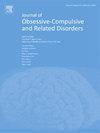Cultural Variability in predictors of mental contamination: A comparison of Turkish and American samples
IF 1.5
4区 医学
Q3 PSYCHIATRY
Journal of Obsessive-Compulsive and Related Disorders
Pub Date : 2025-07-01
DOI:10.1016/j.jocrd.2025.100971
引用次数: 0
Abstract
Mental contamination (MC) involves feelings of dirtiness arising from internal stimuli rather than external stimuli. While cognitive models of contamination fear may apply to MC, its unique features—such as moral elements, diffuse dirtiness, and limited relief after washing—warrant further study. Cross-cultural variability in cognitive factors also remains underexplored. This study examined cognitive factors (i.e., obsessive beliefs, inferential confusion, fear of self, and scrupulosity) in MC among U.S. and Turkish students, aiming to identify shared and distinct processes. A total of 397 U.S. undergraduates and 461 Turkish undergraduates completed self-report questionnaires of MC, other obsessive-compulsive symptom and cognition domains, and general distress. Turkish students reported higher contact contamination, while U.S. students had higher MC. Turkish participants also showed greater Fear of God-related scrupulosity and inferential confusion. Regression analysis revealed that several factors consistently predicted MC across both cultural groups: general distress, contact contamination severity, fear of self, and overestimation of threat. Other predictors varied by culture: inferential confusion and the fear of God were uniquely associated with mental contamination in U.S. students, while fear of sin was a significant predictor only among Turkish students. These findings may reflect differences in cultural context (including prevalent religious doctrine) between U.S. and Turkish cultures.
精神污染预测因素中的文化差异:土耳其和美国样本的比较
心理污染(MC)涉及由内部刺激而非外部刺激引起的肮脏感觉。虽然污染恐惧的认知模型可能适用于MC,但其独特的特征——如道德因素、扩散污垢和洗涤后的有限救济——值得进一步研究。认知因素的跨文化差异也有待进一步研究。本研究考察了美国和土耳其学生在MC中的认知因素(即强迫性信念、推理混乱、自我恐惧和谨慎),旨在确定共同的和不同的过程。共有397名美国大学生和461名土耳其大学生完成了MC、其他强迫症状和认知领域以及一般痛苦的自我报告问卷。土耳其学生报告了更高的接触污染,而美国学生则有更高的MC。土耳其参与者也表现出更大的对与上帝有关的严谨和推理混乱的恐惧。回归分析显示,在两个文化群体中,有几个因素一致地预测了MC:普遍的痛苦、接触污染的严重程度、自我恐惧和对威胁的高估。其他预测因素因文化而异:推理混乱和对上帝的恐惧与美国学生的精神污染有独特的联系,而对罪的恐惧仅在土耳其学生中是一个重要的预测因素。这些发现可能反映了美国和土耳其文化在文化背景(包括流行的宗教教义)上的差异。
本文章由计算机程序翻译,如有差异,请以英文原文为准。
求助全文
约1分钟内获得全文
求助全文
来源期刊
CiteScore
4.00
自引率
5.60%
发文量
46
审稿时长
47 days
期刊介绍:
Journal of Obsessive-Compulsive and Related Disorders (JOCRD) is an international journal that publishes high quality research and clinically-oriented articles dealing with all aspects of obsessive-compulsive disorder (OCD) and related conditions (OC spectrum disorders; e.g., trichotillomania, hoarding, body dysmorphic disorder). The journal invites studies of clinical and non-clinical (i.e., student) samples of all age groups from the fields of psychiatry, psychology, neuroscience, and other medical and health sciences. The journal''s broad focus encompasses classification, assessment, psychological and psychiatric treatment, prevention, psychopathology, neurobiology and genetics. Clinical reports (descriptions of innovative treatment methods) and book reviews on all aspects of OCD-related disorders will be considered, as will theoretical and review articles that make valuable contributions.
Suitable topics for manuscripts include:
-The boundaries of OCD and relationships with OC spectrum disorders
-Validation of assessments of obsessive-compulsive and related phenomena
-OCD symptoms in diverse social and cultural contexts
-Studies of neurobiological and genetic factors in OCD and related conditions
-Experimental and descriptive psychopathology and epidemiological studies
-Studies on relationships among cognitive and behavioral variables in OCD and related disorders
-Interpersonal aspects of OCD and related disorders
-Evaluation of psychological and psychiatric treatment and prevention programs, and predictors of outcome.

 求助内容:
求助内容: 应助结果提醒方式:
应助结果提醒方式:


